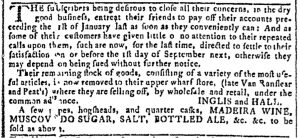What was advertised in a colonial American newspaper 250 years ago today?

“THE subscribers being desirous to close all their concerns, in the dry good business.”
Inglis and Hall were among the most prolific advertisers in the Georgia Gazette in the late 1760s. They frequently inserted lengthy advertisements listing goods imported from Britain, the Caribbean, and other faraway places. They also participated in the transatlantic slave trade, advertising enslaved men, women, and children.
In the summer of 1769, the partners placed an advertisement announcing that they intended to “close all their concerns, in the dry good business.” Like other merchants and shopkeepers, Inglis and Hall extended credit to their customers. In preparation for going out of business, they asked their “friends” to pay any debts incurred prior to January 1. Those who made purchases since then presumably had more time to settle accounts. Despite their amicable description of their customers as “friends,” Inglis and Hall expressed exasperation that some of them “have given little or no attention to their repeated calls” to submit payment. This was the last warning, the partners proclaimed, because those who did not “settle to their satisfaction” in one month’s time “may depend on being sued without further notice.” After first dispensing with that important piece of business, Inglis and Hall promoted their remaining merchandise, advising prospective customers that they still had “a variety of the most useful articles” in stock.
For several years Inglis and Hall provided residents of Savannah and the rest of the colony with vast assortments of goods, encouraging them to participate in the consumer revolution that was taking place throughout the British Atlantic world and beyond. During that time they were also important customers for James Johnston, the printer of the Georgia Gazette. For eighteenth-century newspaper printers, selling advertisements was often more lucrative than selling subscriptions. Most advertisements that ran in the Georgia Gazette were fairly short, extending three to fifteen lines. At fourteen lines, Inglis and Hall’s advertisement announcing the end of their dry goods business was short compared to many others that they placed in the Georgia Gazette, advertisements that filled half a column or more. Although Johnston did brisk business when it came to advertisements, he must have been disappointed to lose such an important customer and all of the revenue Inglis and Hall contributed to the operations of the Georgia Gazette.
